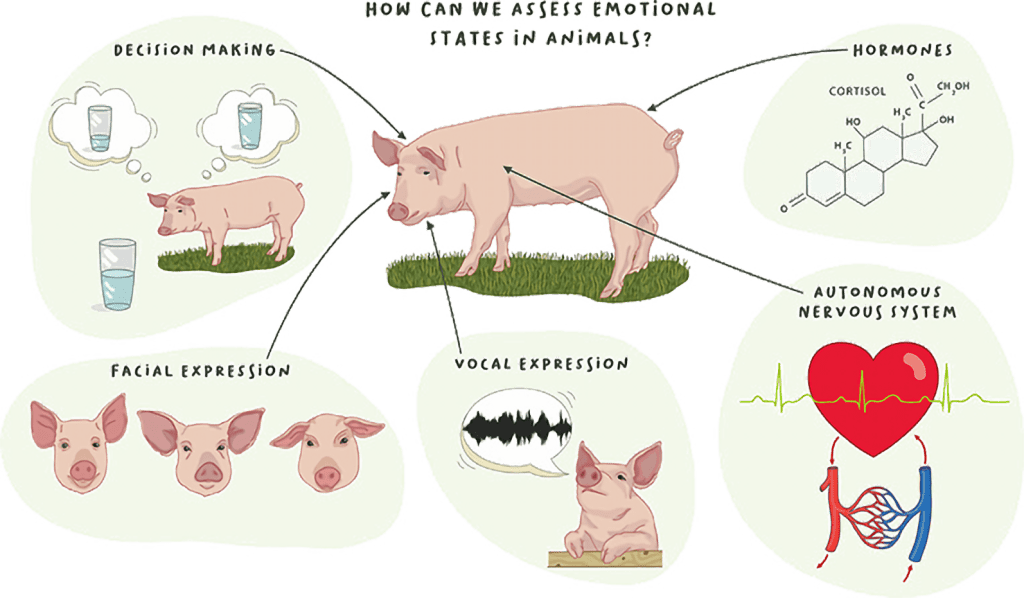Delving into the intricate world of animal emotions and intelligence reveals a profound truth: animals are far more sentient and cognitively complex than we once believed. From elephants mourning their dead to birds solving puzzles with remarkable ingenuity, scientific advancements have uncovered compelling evidence of emotional depth and intellectual capacity across countless species. This growing body of research challenges outdated perceptions, urging us to reconsider how we treat animals in our daily lives—particularly within factory farming systems that often ignore their ability to feel pain, joy, fear, and empathy. By exploring the science behind animal sentience, this article highlights the ethical implications of these discoveries and calls for more compassionate choices in food production and consumption. Join us as we uncover the fascinating inner lives of non-human creatures and examine how understanding their emotions can inspire a kinder, more sustainable future for all beings
The field of animal behavior and cognition has long been a subject of fascination for scientists and laypeople alike. From the complex social interactions of primates to the problem-solving abilities of birds, there is no doubt that animals possess a wealth of intelligence and emotional depth. However, it was not until recently that the study of animal emotions and intelligence gained significant attention in the scientific community. With advancements in technology and research methods, scientists have been able to delve deeper into the minds of animals and uncover the intricate workings of their brains. As a result, our understanding of animal sentience – the capacity to feel, perceive, and experience emotions – has greatly evolved. In this article, we will explore the fascinating world of animal emotions and intelligence, delving into the latest research and discoveries that shed light on the inner lives of our fellow creatures. From the subtle behaviors that reveal emotional states to the surprising cognitive abilities of seemingly simple animals, we will delve into the science of sentience and gain a deeper appreciation for the incredible complexity of the animal kingdom.

Animals possess emotional intelligence too
The recognition of animal emotional intelligence is crucial in shaping our ethical perspectives towards their treatment and well-being. Numerous scientific studies have provided compelling evidence that animals, across various species, possess complex emotional lives and cognitive capabilities. For instance, research conducted on mammals such as elephants and primates has revealed their ability to experience emotions like joy, fear, grief, and empathy. Similarly, studies on birds and certain invertebrates have indicated their capacity for problem-solving and social learning. These findings challenge the traditional view that animals are merely instinct-driven beings devoid of emotions or consciousness. By presenting this scientific evidence on animal sentience, we can build a strong case against their mistreatment in factory farms and advocate for considering their emotions and intelligence in ethical decision-making regarding food production and consumption. It is essential to recognize the intrinsic worth of animals and ensure their well-being by promoting more compassionate and sustainable practices in our interactions with them.

Scientific studies prove animal emotions
Moreover, a multitude of scientific studies has consistently demonstrated the existence of emotions in various animal species. From empirical research conducted on mammals, such as dogs, cats, and dolphins, to studies on avian species like crows and pigeons, the evidence overwhelmingly supports the notion that animals possess a rich emotional repertoire. These studies have used a range of methodologies, including behavioral observations, neuroimaging techniques, and physiological measurements, to examine and measure emotional responses in animals. The findings consistently reveal striking similarities between human and animal emotional experiences, including expressions of joy, fear, anger, and even love. This body of scientific evidence not only challenges the outdated perception of animals as emotionless automatons but also emphasizes the importance of considering their emotions and sentience in ethical decision-making related to their treatment and welfare. By presenting these scientific facts, we can contribute to a more compassionate and humane society that values the well-being of all sentient beings.
Factory farming ignores sentience science
Factory farming, despite the wealth of scientific knowledge on animal sentience, continues to disregard the intrinsic emotional experiences of the animals it exploits. The extensive research conducted across various disciplines consistently reveals the complex emotional lives of animals, yet factory farms persist in subjecting them to cramped and stressful environments, devoid of any consideration for their well-being. The scientific evidence clearly indicates that animals in factory farms, such as pigs, cows, and chickens, not only experience basic emotions like fear and pain but also possess complex cognitive abilities and social structures. By overlooking the science of sentience, factory farming perpetuates a system that not only compromises the welfare of animals but also disregards the ethical necessity of acknowledging their emotional experiences. It is imperative that society recognizes and integrates this scientific evidence into the ethical discourse surrounding the treatment of animals in factory farming and advocates for more compassionate and sustainable alternatives.
Sentient animals deserve ethical treatment
fails to acknowledge the moral imperative to provide ethical treatment to these sentient beings. Sentient animals, with their capacity to feel pain, pleasure, and a wide range of emotions, deserve to be afforded the same ethical considerations as humans. It is our responsibility to recognize and respect their sentience, and to ensure that their lives are free from unnecessary suffering and exploitation. By embracing ethical treatment practices, we can create a more compassionate and just world for all sentient beings, where their welfare and dignity are valued and protected.
Our food choices impact animals
Understanding the impact of our food choices on animals is essential in promoting a more ethical and compassionate society. Extensive scientific evidence supports the fact that animals, particularly those raised in factory farms, possess the ability to experience emotions and exhibit intelligence. By presenting this scientific evidence on animal sentience, we can make a compelling argument against the mistreatment of animals in factory farms and advocate for their consideration in ethical decision-making about food. Recognizing the emotional and cognitive capacities of animals should guide us towards more conscientious choices that prioritize their welfare and minimize their suffering. Whether it involves opting for plant-based alternatives or supporting sustainable and humane farming practices, our food choices have the power to make a significant difference in the lives of countless animals. By embracing this knowledge and actively promoting ethical treatment, we can help build a world that respects and values the sentience of all living beings.
Consider sentience in food ethics
Presenting scientific evidence on animal sentience is crucial when discussing food ethics. The recognition of animals’ ability to experience emotions and exhibit intelligence should serve as a foundation for addressing their mistreatment in factory farms and including them in ethical decision-making regarding food. By understanding the science of sentience, we can make informed choices that prioritize the welfare of animals and minimize their suffering. Considering the emotional and cognitive capacities of animals should guide us towards more ethical practices, such as opting for plant-based alternatives or supporting sustainable and humane farming methods. By incorporating the concept of sentience into food ethics, we can foster a more compassionate and responsible approach to our food choices, ultimately contributing to a more just and ethical society.
Animal emotions are not insignificant
It is becoming increasingly clear that animal emotions are not insignificant. Numerous scientific studies have demonstrated that animals, both domestic and wild, have the capacity to experience a wide range of emotions, including joy, fear, sadness, and even empathy. For example, research has shown that cows and pigs can form deep social bonds with one another and display signs of distress when separated from their companions. Similarly, elephants have been observed grieving the loss of a family member, displaying behaviors that indicate a profound sense of loss and sadness. These findings challenge the notion that animals are simply automatons driven solely by instinct. Instead, they highlight the rich emotional lives that animals lead, urging us to recognize and respect their emotional welfare. By acknowledging the significance of animal emotions, we can advocate for their fair treatment and ensure that ethical considerations are given due importance in our decision-making processes regarding food.
The truth about animal cognition
Presenting scientific evidence on animal cognition further strengthens the argument against the mistreatment of animals in factory farms and emphasizes the need for their consideration in ethical decision-making about food. Studies have revealed astonishing cognitive abilities in various animal species, challenging traditional assumptions about their intellectual capacities. For instance, research has demonstrated that certain bird species display problem-solving skills and demonstrate tool use, indicating a level of cognitive flexibility previously thought to be exclusive to humans. Similarly, primates have been shown to exhibit complex social behaviors, engage in sophisticated communication, and possess self-awareness. These findings demonstrate that animals possess a level of cognitive functioning that goes beyond mere instinct, highlighting their capacity for conscious awareness and mental complexity. By recognizing and respecting the cognitive abilities of animals, we can advocate for their improved treatment, promoting a more compassionate approach to our relationship with these sentient beings.
Sentience is a crucial factor
It is essential to acknowledge that sentience is a crucial factor in ethical decision-making regarding animal welfare and treatment. Sentience refers to the ability to perceive and experience sensations, including pleasure, pain, and emotions. Scientific research has provided compelling evidence that many animals, including mammals, birds, and certain invertebrates, possess the capacity for sentience. Neurological studies have revealed similarities in brain structures and processes between humans and other animals, further supporting the presence of conscious awareness in non-human beings. Moreover, behavioral observations have demonstrated that animals display a wide range of emotions, such as fear, joy, and empathy, indicating a complex inner world that should be considered in discussions surrounding their rights and treatment. Recognizing the sentience of animals is not only a matter of scientific accuracy but also a moral imperative, urging us to prioritize their well-being and avoid unnecessary suffering. By incorporating the concept of sentience into ethical frameworks and decision-making processes about food production and consumption, we can strive towards a more compassionate and sustainable approach that respects the inherent value and dignity of all sentient beings.

Science supports ethical consumption choices
Presenting scientific evidence on animal sentience can play a crucial role in shaping ethical consumption choices. As our understanding of animal emotions and intelligence grows, it becomes increasingly clear that mistreatment of animals in factory farms is both ethically problematic and scientifically unsound. Research has shown that animals in these settings experience not only physical pain but also psychological distress and suffering. By considering the scientific evidence on animal sentience, individuals can make informed decisions about their food choices, favoring options that prioritize the well-being of animals. This includes supporting sustainable and humane farming practices, choosing plant-based alternatives, and advocating for policy changes that align with the scientific understanding of animal emotions and intelligence. Incorporating science into ethical decision-making encourages a more compassionate and responsible approach to consumption, ensuring that our choices align with our values and respect for animal welfare.
In conclusion, the study of animal sentience is a constantly evolving field that offers valuable insights into the complex emotions and intelligence of non-human species. Through scientific research and observation, we can gain a deeper understanding and appreciation for the cognitive abilities and emotional experiences of animals. It is important for us to continue to educate ourselves and advocate for the ethical treatment of animals, recognizing that they are sentient beings deserving of respect and consideration. With continued advancements in research and technology, we can continue to unlock the mysteries of animal sentience and enhance our relationships with the creatures we share this planet with.
4.1/5 - (15 votes)



